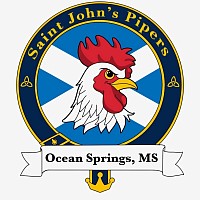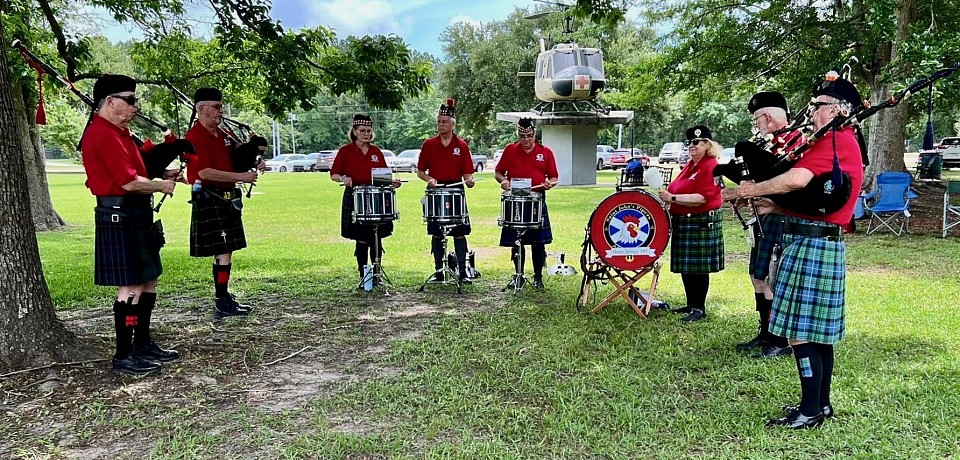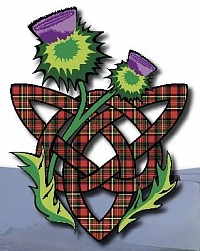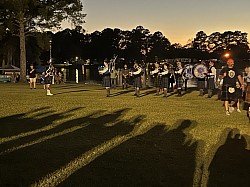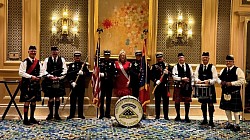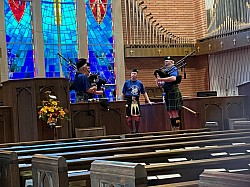The St. John's Pipes and Drums
Why We Play the Bagpipes
The easiest answer to that is "because it looks cool, and very few can actually do it." However, the real answer is that it's a huge part of the history of the people who settled here before the War of Independence and after. Let's examine the call of the pipes in the US first, before we take up the question of why there is no piping on the Coast.
For most early 1900’s Celtic immigrants fleeing famine, persecution, and British greed in Scotland and Ireland, good jobs on arriving in the New World were scarce, but joining the local police or fire department ensured good wages and a steady position in society. These jobs were considered very dangerous and most people wouldn’t consider taking them because of the risk of violent death. However, these jobs were a godsend to a hungry and desperate Scotsman or Irishman trying to feed a large family.
Fire and Police Bands initially formed out of the Irish gangs, welfare and social societies and clubs, over time evolving into the more well-known Emerald and Thistle Societies. The names come from where the majority of immigrant Celts came from - Ireland, the Emerald Isle, but the Scots immigrants, too, joined groups, bringing with them the pipes and dress now considered ‘traditional’ for pipe bands. The Societies encouraged more and more of their members to enroll and formed music clubs and Ceilidh bands to keep their ethnicity and culture present and fresh.
Death was ever-present for the Celtic immigrants. It was considered unmanly for a grown adult Irishman or Scotsman to weep even when death of his brothers brought ruin and pain. However, the mournful cry of the pipes at a funeral provided an excuse for everyone to weep for their brothers in uniform, and the laments played on the pipes helped ease the pain of a friend’s death. For Police and Fire departments, Emerald Society and Kiltie bands quickly became intricately woven into their memorial ceremonies, a powerful tradition that remains to this day.
As piping for ceremonies in the U.S. matured, it wasn’t long until the mournful sounds of a bagpipe were being played for non-Irish fallen firefighters and police officers - and soon after that, the U.S. military incorporated bagpipes into their ceremonies, as players took their instruments into service with them. As a historic instrument of war, many in the military believe the sound of the bagpipes adds a martial and dignified air to any military event.
Bagpipe bands in the North are common for police and firefighters. On average, in the northeast of the U.S. and into Canada, bands may have more than 60 uniformed members. However, no longer are the bagpipes just played for Irish police officers or firefighters - they have become a distinguishing feature of memorial services for fallen heroes of any stripe.
Laments on the bagpipes are truly beautiful pieces of music. Most often, however, it's “Amazing Grace” that is the bagpipe tune most hear played at memorial services. Pipe bands usually play it three times, because each of the three stanzas of “Amazing Grace” has a particular meaning. The first, usually played by a lone piper, pertains to being born, the second played in unison by the band, represents life with family, friends and department brothers and sisters, while the last is played in harmony, representing our death, leaving the family alone with the memory and hope for the future.
Other tunes, like Going Home; Dark Isle; Flowers of the Forest; Highland Cathedral; Hector the Hero; Bells of Dunblane and many more can make for a somber and majestic atmosphere, but it's the tried and true Amazing Grace which seems to be the most recognized and most requested tune we play.
But why did we choose Ocean Springs, MS? The group was formed after attempts by several local Fire Departments to create an Honor Guard Band were shelved due to the expense and difficulty of attracting and retaining experienced players. Coincidently, after Katrina, Bill Muzzy moved into the Ocean Springs area and began looking for other pipers to play with. He was patient, but not successful, as one or two pipers would meet for a while, play some events, and then leave. Meantime, Bill concentrated on Grandfather Mountain and Stone Mountain Highland Games, building up a vast network of teachers and experts, and a tremendous reputation as he did so.
A local Gulf Coast Pipe Band never fully cohesed into Bill's vision. There just were no pipers here, or at least none that were interested in forming a band. That may have changed when two new members from the defunct Gulfport Fire Dept. Honor Guard band began working consistently with Bill, and for the last ten years, the small group of bagpipers has been meeting, practicing and playing at the St John’s Episcopal Church in Ocean Springs, growing slowly but consistently.
Most of our band members are veterans of the police, fire and military services spanning Canada, New Zealand and the USA, but all of us love the instrument, and the core has continued to practice and play while actively encouraging new members to join. Sadly, new members are few and far between. Several enquiries have been received since the website went up, so hope springs eternal, and we have also been able to refer potential pipers to bands closer to their homes rather than have them drive some distance and time to work with us.
Our members have been featured at police funerals, fire and police academy graduations, weddings, festivals, parades and graveside performances in both individual and group ensembles. We provide free lessons for beginner and advanced pipers. Several special workshops throughout the year focus on bagpipe maintenance, reed management and techniques.
We also have a small group that works on Ceol Mor, better known as Piobaireachd (pronounced “Pea-brok”), the ancient classical music of the Great Highland Bagpipe.
